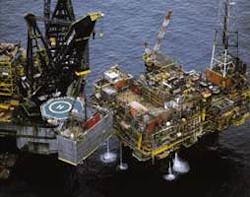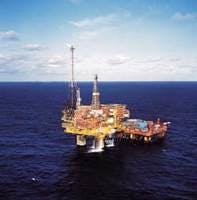Brent field redevelopment project marks progress
DB 102 crane barge lifts a replacement living quarters module aboard Brent Charlie platform, May 1996. Photo courtesy of Shell/Esso.
Shell U.K. Exploration & Production has brought all production systems on Charlie platform in North Sea Brent field back into operation after completing refurbishment work during the summer.
Brent C was the second of four platforms in U.K. Block 211/29 Brent field to be upgraded, under a £1.3 billion ($1.95 billion) project preparing Brent for gas production as its oil reserves are depleted (OGJ, Apr. 12, 1993, p. 28).
Brent C restart
Low-pressure gas compressors on Brent C were brought into operation Nov. 19, at which point Charlie was declared fully on stream. At OGJ presstime, Brent C output was 51,000 b/d of oil and 175 MMcfd of gas.
Brent C has capacity to produce 150,000 b/d of oil and 270 MMcfd of gas. Drilling operations are scheduled to resume Dec. 6, with the aim of raising Brent C oil output to more than 100,000 b/d by April 1997.
Brent has estimated remaining reserves of more than 1 billion bbl of oil equivalent, making it U.K.'s largest field despite having been in production for 20 years (OGJ, Nov. 25, p. 35).
Brent field crews are now working to prepare Brent Delta platform for shutdown, to allow replacement of the accommodation module, process facilities, and flare tower.
Shell Expro, U.K. operating venture of Shell U.K. Ltd. and Esso Exploration & Production U.K. Ltd., has scheduled Brent D shutdown from end of the first quarter 1997 to end of first quarter 1998.
Walter van de Vijver, Shell Expro Brent field general manager"Brent Bravo refurbishment was a pain in the neck. We overspent our budget, but this was the start of our learning curve, and we now have a target to complete redevelopment for £1.1 billion ($1.65 billion), down from our original budget."
Lessons learned
However, Shell/Esso anticipates lessons learned in refurbishment-first of Brent Bravo, then of Brent Charlie-will help in reducing the period of lost production.
Walter van de Vijver, Brent field general manager, said, "Brent Bravo refurbishment was a pain in the neck. We overspent our budget, but this was the start of our learning curve, and we now have a target to complete redevelopment for £1.1 billion ($1.65 billion), down from our original budget.
"We were very depressed after Bravo, because we thought our costs might continue to grow, but using the same people and learning as we went along has enabled our optimism to grow.
"As a result of lessons learned on Brent Charlie, next year we are thinking about combining maintenance and engineering support operations under one contract."
Van de Vijver said Brent B refurbishment was budgeted at £469 million ($704 million) but had actually cost 10-15% more. With Brent Charlie, "things turned out better than we'd predicted."
Shell/Esso is currently preparing Brent Delta platform for refurbishment, which will include replacement of quarters, process modules, and the flare tower. Safe Gothia accommodation vessel is moored alongside Brent D platform to house the extra workforce. Photo courtesy of Shell/Esso.
Gas recovery
Martin Wilson, Brent petroleum engineering manager, said depressurization of the reservoirs is expected to lead to recovery of an additional 34 million bbl of oil and 1.5 tcf of wet gas.
Key to Brent redevelopment is depletion of remaining pockets of oil and condensate. This has been bypassed in earlier production, which left liquids trapped in faulted crests within the reservoirs.
"Gas pressure in the reservoirs will be used to produce residual oil," said Wilson. "Our strategy is to maintain the gas cap and move wells around to chase the oil rim."
Brent's associated gas maintained the supply contracts in early years, but Wilson said gas production is now from the gas cap, so oil production has also to be planned to help release gas to keep the cap "topped up."
"When Charlie came back on stream," said Wilson, "we ceased water injection in Brent's western flank. We are now operating the field at slightly lower pressure, but this is not the 'real' depressurization program. It doesn't affect oil production and will help us in learning how depressurization will work."
Copyright 1996 Oil & Gas Journal. All Rights Reserved.


